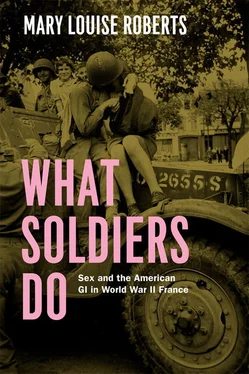It was a giddy morning. The invasion—so long awaited, so long anticipated—had at last arrived. Winks were exchanged as people shook hands. 108The murmur of three words passed from one Norman ear to another: “C’est le débarquement!” In a matter of hours, no one would need to be told. As “the thunder of war approached,” the Germans shut down the towns. Pierre Desprairies remembered the atmosphere as a strange mix of fear and hope. 109When the first bombs hit, remembered Antoine Anne, “personally I thought my lungs were going to burst.” 110“The bombs are beginning to fall quite near us,” wrote Michel Braley in his diary, “the machine gun has started to fire constantly. Because of it, we completely forgot to eat. We can no longer distinguish between the German and the American bombs. It is a constant rotation with bombs falling around the house.” 111Fernand Broeckz was paralyzed by fear that his house was going to fall down on his family. “The walls were blown open, the floorboards rose and fell. You could hear the tiles falling and the windows breaking.” A bomb literally wrapped a wall around his wife. 112In his diary of 6 June, the young Jacques Petit expressed his disbelief that he and his friends had looked forward to this moment with “romantic enthusiasm”: “Huddled together, we believed our last hour to be near, and while the bombs whistle, we wait for that direct hit which would at last bring our agony to an end.” 113Remembering 1914, older men dug trenches near their houses and sheltered their families in this way. Villagers crowded into the basements of the local chateaus, not only because their thick walls offered solidity, but also because no one wanted to die alone. “Solitude was feared,” remembered one civilian. 114The only Normans exempt from the racket were the hard of hearing. Antoine Anne recalls that as the dust from one bomb cleared, he saw his deaf grandmother sitting in a chair, holding his brother in her arms, completely calm. 115
There was no getting around the fact that the liberators were bringing the war with them. But then again, the war was bringing the liberators. The French had been waiting a long time. The signs of their arrival were sometimes quirky. Chanoine Bertreux heard someone shouting orders but not in German. 116A serpentine trail of cigarette smoke drifting over a hedgerow provided the first glimpse of another American. 117Still another sign was the sound of trucks and tanks. As a child, Christiane Delpierre linked the coming of the Americans with the “rumbling of motors.” 118“Down the road you could hear a constant droning,” remembered Jean-Jacques Vautier. “We went to the edge of the road, our hearts beating fast. At the high point appeared a helmet, helmets, a car. Slowly the convoy descended. When the first car, a sort of ‘scout car,’ had come down to our level, we all burst out cheering.” 119That “scout car” or jeep made an indelible impression on the French. “Are the Americans really winning the war with these contraptions?” wondered Robert Clausse. 120Still others considered it to be American magic—the eighth wonder of the world. 121
There was little opportunity for formal introductions. In many cases, GIs and civilians caught their first glimpse of each other through a storm of bullets. In Remilly-sur-Lozon, Jacques Lepage at one point realized he was literally standing between the Allies and the Germans with artillery passing over his head. He evacuated his house, and when he returned, he found three dead Germans in his kitchen. 122Auguste Couillard’s home in Remilly switched back and forth between German and Allied control, at one point serving as a prison for German POWs. 123Also in Remilly, Marguerite Pottier and her family “were between two fires because the Germans were only a few meters from us.” The Americans shouted that her family should leave: “Grand Combat!!!!” they screamed. 124In the same town, the Germans planted a bomb in the chimney of one house. In the heat of the battle, the Americans deactivated but did not remove it. When a refugee went to cook pot-au-feu in the fireplace, she got a bomb inside her pot. 125
As the fighting moved into their backyards, Normans joined the battle. They informed Americans concerning German positions, and showed them shortcuts and hideaways in the woods. 126Particularly in the first few hours of the invasion, as soldiers from the Eighty-Second and 101st Airborne parachuted into a wide area around Caen and Sainte-Mère-Église, civilians came forward. When two hundred GIs parachuting into Graignes fell into the marshes (flooded on purpose by the Germans), locals rescued them by boat, took them into their houses, cared for the wounded, and fished the parachutes out of the water before dawn so that the Germans would not see them. 127Arthur and Berthe Pacary also cared for stranded parachutists in the region of Remilly by bringing them whipped cream and other provisions. “They badly needed to be cared for and cleaned,” recalled the couple. 128Marguerite Pottier’s parents were relieved when they discovered paras hiding in their garden, as they had wondered what unknown animal was stealing their cabbage. For their part the Americans were happy to eat something else. 129Still other Normans smuggled paras back to the American lines by dressing them as civilians and equipping them with maps. 130According to Pierre and Yvonne Ferrary, two paras wandered Grandcamp-les-Bains in broad daylight, their guns beneath their arms, laconically asking, “the port, the port?” 131
Still other Normans cared for the wounded. Michel Braley recorded in his diary how a badly wounded American soldier had staggered into their farm. They could not do much for him except give him coffee with eau-de-vie and show him the location of the first aid station. As he was leaving, the GI took out his New Testament and a photograph of his parents for one last look. “We tell him that we are also protestants. He thanks us and leaves. The bombs continue to rain down on us.” 132Thirteen at the time, Odette Eudes of Sainte-Mère-Église remembers that when a wounded soldier who sought shelter at their house could not walk to the first aid station, her father proposed that he carry him on his back. The soldier refused, saying that if a German took a shot, both of them would be killed. 133Sometimes entire villages mobilized to help the Allied soldiers. Virtually all the women in le Mesnil-Vigot, northwest of Saint-Lô, devoted themselves to tending to the wounded there, even when the village was still under German control. Besides taking GIs into their farms and homes, these women carried them under German fire to a nearby hospital. One woman, Madame Dépériers, also risked her life by walking to nearby Remilly-sur-Lozon in order to get a surgical probe for a GI. 134
Despite such shows of comradery, however, GI and civilian often met under an umbrella of mutual mistrust. The Allies worried about German ambushes, particularly in the scrappy field-to-field fighting of the early campaign. 135They were given orders not to trust the French, and to assume that all French people were spies or collaborators. 136It did not help that British journalists reported rumors that more than half the Normans were not to be trusted, and that they had no wish to be liberated. 137Paratrooper Donald Burgett refused a Norman’s offer of wine because “I just didn’t feel like being poisoned.” 138In turn, eleven-year-old Louis Blaise was terrified when two GIs with “blackened faces and furious expressions” searched her house the morning of the sixth of June. 139“Paralyzed by fear,” the nearby Bré family also huddled together while an American searched their house. 140Young French men who wandered around American-held beaches were arrested or interrogated. 141Resisters eager to provide crucial intelligence were ignored or detained. 142The schoolteacher Germaine Martin fell prey to suspicion when the GIs found on her person a map revealing the location of a German radio post. Even though, as she explained, she had picked it up by accident, she was accused of being a spy. When the Americans discovered their error, they apologized and gave her two boxes of chocolate. 143
Читать дальше












